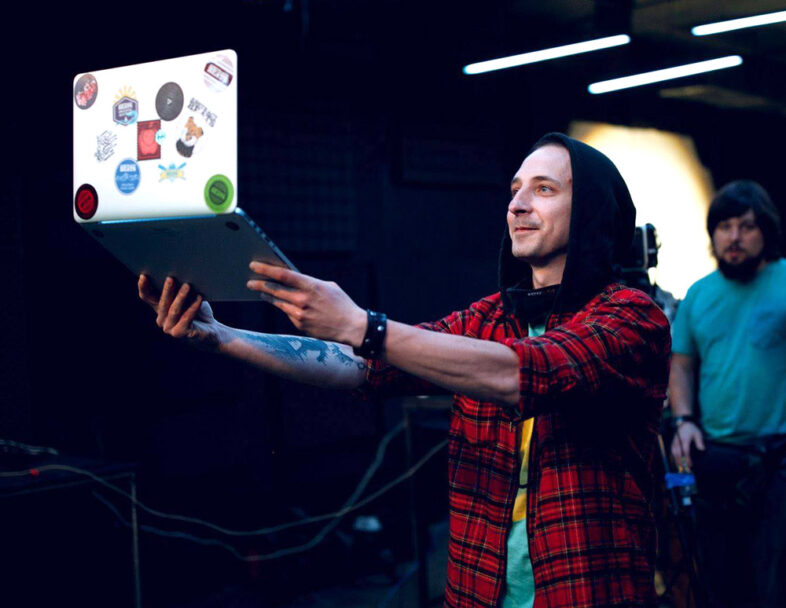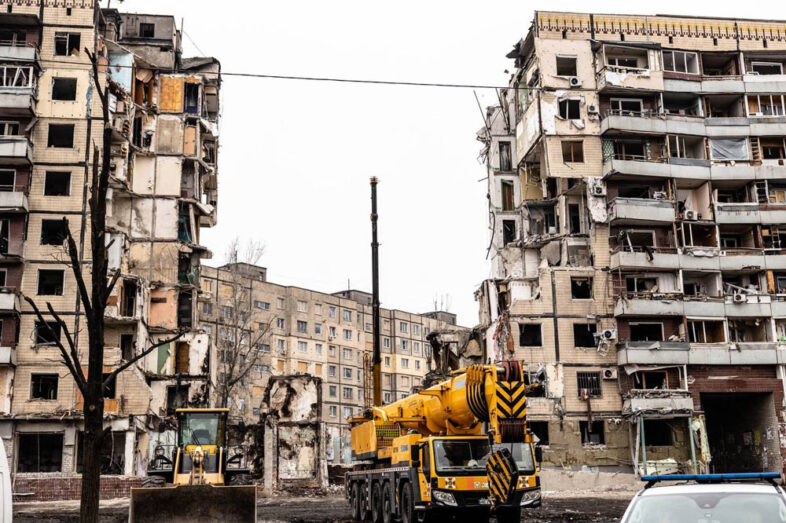You can find the first part of this story here:
The reality of Dnipro reveals itself in layers of resilience and sacrifice. After the initial weeks of stunned silence, the city gradually emerged from its shell of shock. It bid heartfelt farewells to those it had lost and extended warm welcomes to the displaced from Mariupol and the eastern regions. Yet, as the city settled into this new rhythm, a striking phenomenon unfolded: half of the local volunteers, whose commitment to the cause had ignited during the Maidan protests, left for the front lines. Among them were veterans who, despite the challenges of prosthetics, continued their fight. Politicians, journalists, hosts, poets, actors, dancers, and musicians—all of them found their way to the battlefield, driven by an unyielding sense of duty.
Andriy Dobrovolskyi, a seasoned veteran of the Russian-Ukrainian war spanning 2014 to 2022, stands as a testament to unwavering resilience. A sergeant in the National Guard of Ukraine, Dobrovolskyi suffered two significant wounds and survived the harrowing encirclement at Ilovaisk in 2014. Despite these trials, he continues to serve his country.
“After a decade of war, Dnipro, a true fortress, has only grown more resilient. At the dawn of the full-scale invasion, my comrades and I from ‘Dnipro-1’ enlisted in the National Guard. By March, we were entrenched on the front lines in Rubizhne. We faced bitter retreats, abandoning Severodonetsk and Lysychansk, yet we also played a role in the Kharkiv offensive and the liberation of Lyman. In December 2022, I was grievously wounded by a PFM-1 mine, losing a third of my shin. Following a period of rehabilitation and prosthetic fitting in my hometown of Dnipro, I now serve in a staff role with the ‘Khartia’ unit.”
Who stepped forward as volunteers post-2022? Notaries, lawyers, business leaders, and even elements from the criminal underworld all took up the call. The authorities in Dnipro garnered formidable public backing. The cultural sector surged with acts of national liberation. The iconic venue Module, a bastion of artistic life, joined the defence of Ukraine and has already endured losses. These were individuals of high cultural and intellectual potential, poised to enrich global culture and musical history. Their sacrifice echoes the tragic tale of Ukraine’s ‘Executed Renaissance’, when Soviet repression silenced the country’s brightest artistic minds.

Yevhen Honcharov, a co-founder of Abstract Beats, the Module arts space, and the Dnipropop music label is preparing to join the Ukrainian Armed Forces in September 2024.
“In 2014, as news of Crimea’s occupation and the seizure of regional administrations in Donetsk and Luhansk began to filter through, Dnipro seemed to awaken, resolutely charting its course. Though the initial surge of patriotic fervour waned over time, it never vanished completely. As the full-scale invasion unfolded, Dnipro remained steadfast.
Our small community mobilised swiftly—about twenty of us enlisted in the Defence Forces within days, forming the Module Squad unit. We faced the trials of war with a blend of resolve and unity, determined to make a difference in the face of adversity.”
The mission for those who remained was clear: to provide our fighters with protection, sustenance, communications, clothing, and medical supplies. We mastered the craft of sewing plate carriers, sourced steel manufacturers, and outfitted everyone with body armour. Large-scale fundraising efforts were organised—130 radios, 130 helmets, and ten vehicles were secured. Thanks to our connections with musicians across Europe, we imported drones, equipment, and medical supplies. Our experience in music and event management proved invaluable for raising the necessary funds. On April 1, 2022, we held our first concert under the ‘Curfew Jazz’ banner, bringing our community together. This event not only raised spirits but also inspired further support for the military. The Dnipropop label embarked on a charity tour across Ukraine, and we hosted the ‘Check-in’ festival twice to support displaced businesses. Our artists performed over 200 concerts.
“This is crisis management at its core. Nevertheless, I’ve decided to join the Armed Forces of Ukraine voluntarily. I believe my skills can be of greater use there. I’ll be engaged in aerial reconnaissance and operating strike UAVs with the ‘Clear Eyes’ unit.”
Many restaurateurs, as well as owners of hotels and bars, have redirected their businesses to the war effort, channelling profits to support familiar brigades or friends and colleagues serving in the military.
Olha Lohush, the owner of the O.W.L.S. space and founder of the Bobova Chashka dry soup project for the Armed Forces of Ukraine, has built a supportive network around her. She maintains that while living one’s life during wartime is not inherently wrong, one must always anticipate the next move.
“Over the past decade, Dnipro has evolved and continues to grow. Yet, within my own circle—a community active since 2014—the city’s efforts still feel insufficient. At the onset of the invasion, fear gripped everyone, but we knew that only through collective action could we make a difference. Initially, it seemed as though everyone shared this conviction. But about six months in, it became clear that wasn’t universally true. Nevertheless, in my network, everyone is either volunteering or fighting. We launched the Bobova Chashka project, providing meals to the frontlines for two years and delivering over 10 tonnes of soup.
I continue transporting and repairing vehicles and procuring essential equipment for close-knit units—anti-tank operators, special forces, air defence, marines, and aerial reconnaissance. Currently, the bulk of my volunteer work revolves around fundraising, an unavoidable necessity. My friends and I often feel as though we are falling short in our support for the military. Yet, stepping into the broader world, it appears that many are simply carrying on with their lives. Yes, there have been bombings, but people maintain that ‘we trust in the AFU and air defence.’ Still, in my view, wartime requires anticipating the future and thinking two steps ahead.”
The religious dimension of Dnipro’s resilience is noteworthy. Almost every church now houses a humanitarian aid centre, and approximately 30 clergy members from the region serve as chaplains and officers in the Armed Forces of Ukraine. The Ukrainian Orthodox Church of the Dnipropetrovsk Eparchy has been instrumental in bolstering the city’s support network.
Dmytro Povorotnyi, Senior Lieutenant of the Chaplaincy Service and chaplain at the Military Medical Clinical Centre of the Eastern Region, previously took the artistic-volunteer project Posipaky (Minions) to the frontlines, offering performances and greetings before 2022. He is also a founding figure behind the Heroes’ Alley near the Dnipropetrovsk Regional State Administration, established in 2014.
“In 2022, the city initially surged into volunteering and defence efforts, only to later recalibrate its focus. While the enthusiasm waned, support became more targeted, with individuals concentrating on their immediate circles. Families began to support relatives in the military, and businesses extended their backing to employees in the Armed Forces. Dnipro adopted a more structured approach to assistance. Over a decade of Russia’s war against Ukraine, the Ukrainian Church has emerged as a respected institution, shedding its image as a mere relic of a bygone era. Humanitarian hubs sprang up in churches, many military personnel began attending services, and priests took on roles as chaplains—a trend that continues to surprise and inspire.”
Previously, clergy associated with the Ministry of Defence were linked to the enemy’s patriarchate, performing their duties in a strictly formal manner. However, since 2014, there has been a marked shift in the institutional approach. Ukrainian chaplains began volunteering directly at the frontlines, and in 2021, legislation elevated their status to that of officers. Now, approximately 30 priests from the Dnipro Eparchy serve as official chaplains in the Armed Forces of Ukraine.
The post-invasion period saw the end of debates over street names and the appropriateness of such changes. Streets now bear the names of Bandera, Konovalets, Lesya Ukrainka, and other figures crucial to national identity, alongside the names of Ukrainian heroes and military units. The Ukrainian Church has evolved significantly, with chaplains no longer seen as merely superstitious figures dispensing holy water and blessings in times of crisis. Today, priests are trained in psychology to offer scientifically grounded support to those struggling in the aftermath of the war. Thus, Dnipro stands out as a city that plays a pivotal role in the liberation struggle and contributes on multiple levels.

Dnipro is a city of stark contrasts. By night, it echoes the vibrancy of renowned global capitals; by day, it resembles a frenetic anthill infused with the aromas of coffee and craft beer, alive with music, and abuzz with theatre-goers. Yet, beneath this energetic facade, the city grapples with profound anxiety and fear. The scars of missile strikes and the loss of its residents, including soldiers bearing prosthetics, are acutely felt.
The cityscape tells a sad tale: a towering apartment block in the Peremoha district, buildings in the city centre, repeated hits at the Troitsky market, the bus station, and a residential structure near the railway. Private homes housing civilian families, a shopping centre struck twice, a significant space facility, and the adjacent maternity hospital, along with hospitals and veterinary clinics, have all borne the brunt of this war. The statistics are undeniably bleak.
However, unlike Kharkiv, Bucha, Maryinka, or Bakhmut, Dnipro seems to be “holding on.” This resilience may be due to effective air defences or the city’s long-term preparations since 2014. Our hospitals are equipped with volunteer centres, soldiers are quickly accommodated, and the State Emergency Service and other critical units operate efficiently. Additionally, many psychologists and psychotherapists are available to provide immediate support at strike sites.
It would be comforting to end the conversation with the reassuring words, “everything will be fine,” but that would be misleading. True reassurance will come only when everyone contributes, either through donations or by joining the Armed Forces. For now, we just carry on, living and fighting on.
Over the past decade, the cemetery on the city’s edge has become increasingly adorned with Ukrainian flags, each marking the final resting place of a soldier. Meanwhile, memories resurface of 2014, when a dozen coffins with plaques reading “temporarily unidentified” stood solemnly under the rain in Heroes’ Square.
We bade farewell to both strangers and loved ones as cars drove by and pedestrians strolled past. The future was shrouded in uncertainty. Only the soldiers in Donbas had warned of the relentless cycle of loss and injury to come. Dnipro remains a steel fortress under the blue-and-yellow flag, a battleground where deputies clash with veterans; some ignite military vehicles while others persist in equipping the front lines with new ones. Yet, in times of heightened conflict, people will hurl jars of pickles at drones and missiles from their windows, children will sing the Ukrainian anthem, and the resolute Armed Forces of Ukraine will continue to drive the enemy into eternity.

